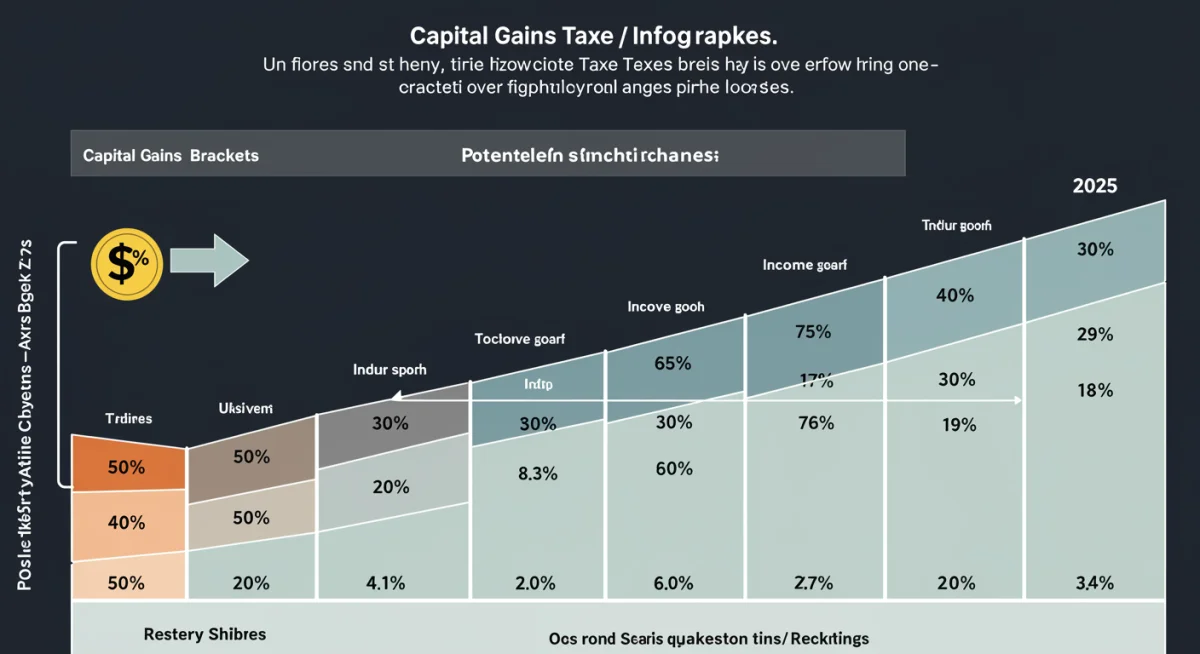2025 Tax Code Changes: Key Updates for US Investors

Understanding the 2025 US Tax Changes is crucial for investors, as upcoming legislative shifts could significantly impact investment strategies, capital gains, and estate planning across various asset classes.
As we approach 2025, the landscape of taxation for US investors is poised for significant shifts. For many, the phrase “Navigating the 2025 Tax Code Changes: 7 Key Updates for US Investors” might sound daunting, but understanding these potential amendments is not just about compliance; it’s about optimizing your financial future. Proactive planning can turn potential challenges into strategic advantages, safeguarding your wealth and maximizing returns.
Understanding the Sunset Provisions of TCJA
The Tax Cuts and Jobs Act (TCJA) of 2017 brought sweeping changes to the US tax system, many of which are set to expire, or “sunset,” at the end of 2025. This means that without new legislation, several key provisions affecting individual taxpayers and, consequently, investors, will revert to pre-TCJA law. This impending expiration creates a unique environment for financial planning, demanding a careful review of current strategies.
The sunsetting of these provisions impacts a broad spectrum of financial activities, from individual income tax rates to specific deductions and credits. For investors, this translates into potential changes in how investment income is taxed, the deductibility of certain expenses, and the overall after-tax return on their portfolios. Preparing for these shifts requires a deep understanding of what’s expiring and what new legislation might take its place.
Individual Income Tax Rate Reversions
One of the most significant changes expected is the reversion of individual income tax rates. The TCJA lowered tax rates across most brackets, but come 2026, these rates are scheduled to increase. This could have a direct impact on how investment gains, especially those classified as ordinary income, are taxed.
- Higher Ordinary Income Tax: Investors with substantial short-term capital gains, interest income, or rental income might face higher tax liabilities.
- Strategic Income Timing: Consideration of accelerating income into 2025 or deferring deductions to future years could become a critical strategy.
- Bracket Creep: The return to older tax brackets might push some investors into higher tax tiers than they are currently accustomed to.
The implications extend beyond just the tax rate itself, influencing decisions on when to realize gains, how to structure income-generating assets, and the overall efficiency of an investment portfolio. Understanding these rate changes is the first step in effective financial recalibration.
Potential Changes to Capital Gains and Dividends
Capital gains and qualified dividends are often subject to preferential tax rates compared to ordinary income. However, the 2025 tax code changes could bring adjustments to these rates, directly affecting investors who realize profits from the sale of assets or receive dividends from eligible corporations. These changes are particularly relevant for long-term investors and those relying on dividend income.
The current framework provides specific tax brackets for long-term capital gains and qualified dividends, typically lower than ordinary income rates. Any alterations here could significantly reduce the after-tax profitability of investments. Investors need to monitor legislative discussions closely to anticipate how these rates might evolve.
Evaluating Long-Term Capital Gains Rates
The preferential treatment of long-term capital gains (assets held for over a year) has been a cornerstone of investment planning. If these rates increase, the incentive to hold assets for the long term might be somewhat diminished, or at least require a reassessment of portfolio turnover strategies.
- Impact on Asset Sales: Investors planning to sell appreciated assets in 2026 or beyond might consider accelerating sales into 2025 to lock in current rates.
- Portfolio Rebalancing: Rebalancing strategies might need to account for higher future capital gains taxes, potentially favoring tax-efficient investment vehicles.
- Understanding Basis: Accurate tracking of cost basis becomes even more vital to minimize taxable gains effectively.
The discussion around capital gains also frequently includes proposals for higher-income individuals, potentially introducing additional surcharges or higher top rates for substantial gains. This level of scrutiny necessitates a proactive approach to portfolio management and tax planning.

Impact on Retirement Accounts: IRAs and 401(k)s
Retirement accounts like Individual Retirement Arrangements (IRAs) and 401(k)s are critical components of long-term financial planning for many US investors. The 2025 tax code changes could introduce modifications to contribution limits, distribution rules, or the tax treatment of these accounts, influencing how individuals save for retirement and manage their nest eggs.
These accounts offer significant tax advantages, such as tax-deferred growth or tax-free withdrawals in retirement. Any adjustments to these benefits could alter the attractiveness of different retirement savings vehicles and require investors to re-evaluate their retirement planning strategies. Understanding these potential changes is key to maintaining a robust retirement plan.
Contribution Limit Adjustments
While contribution limits for IRAs and 401(k)s are typically adjusted annually for inflation, the 2025 tax code changes could see legislative intervention that goes beyond standard inflation adjustments. This could involve significant increases or, less likely but possible, decreases in how much individuals can contribute on a tax-advantaged basis.
- Maximizing Contributions: If limits increase, investors should aim to maximize contributions to take full advantage of tax benefits.
- Roth vs. Traditional: Changes could influence the optimal choice between Roth and traditional accounts, depending on projected future tax rates.
- Catch-Up Contributions: The rules around catch-up contributions for older savers might also be subject to review, affecting those nearing retirement.
Beyond contribution limits, discussions around required minimum distributions (RMDs) or the taxation of rollovers could also emerge, adding another layer of complexity to retirement planning. Staying informed about these potential shifts is vital for securing a comfortable retirement.
Estate Tax and Gift Tax Considerations
For high-net-worth individuals and families, the estate and gift tax exemptions are a critical element of intergenerational wealth transfer. The TCJA significantly increased these exemptions, but they are also scheduled to revert to much lower levels at the end of 2025. This looming change presents a narrow window for strategic estate planning.
The current high exemption amounts allow individuals to transfer substantial wealth without incurring federal estate or gift taxes. The reversion to pre-TCJA levels would mean a drastic reduction in these exemptions, potentially subjecting more estates to federal taxation and increasing the tax burden on inherited assets. This makes proactive planning before 2026 extremely important.
Strategic Gifting and Estate Planning
Given the anticipated decrease in estate and gift tax exemptions, individuals with significant assets should consider utilizing the higher current exemptions while they are still available. This involves making substantial gifts during 2025 to leverage the existing favorable rules.
- Annual Gift Exclusion: Continue to utilize the annual gift tax exclusion to transfer wealth tax-free.
- Lifetime Exemption Use: Consider making large lifetime gifts up to the current exemption amount to remove assets from your taxable estate.
- Trusts and Other Vehicles: Explore advanced estate planning techniques, such as various types of trusts, to efficiently transfer wealth and minimize future tax liabilities.
The potential for a lower estate tax exemption underscores the urgency for individuals to review and update their estate plans. Consulting with an estate planning attorney and financial advisor is crucial to navigate these complex rules and implement effective strategies before the changes take effect.
Business Tax Implications for Investor-Owned Entities
Many investors hold assets through various business structures, such as S corporations, partnerships, or limited liability companies (LLCs). The 2025 tax code changes could also bring modifications to business tax provisions, which in turn affect the individual investors who own these entities. Understanding these potential shifts is crucial for optimizing the tax efficiency of investment-related businesses.
The TCJA introduced several significant changes for businesses, including the qualified business income (QBI) deduction and corporate tax rate reductions. While the corporate rate reduction was made permanent, other provisions affecting pass-through entities are tied to the sunset clauses, meaning their future is less certain. Investors with business interests need to assess how these changes might impact their overall tax burden.
Qualified Business Income (QBI) Deduction
The QBI deduction, also known as the Section 199A deduction, allows eligible owners of pass-through businesses to deduct up to 20% of their qualified business income. This deduction is one of the provisions set to expire at the end of 2025, which could significantly increase the tax liability for many small business owners and investors.
- Loss of Deduction: Without legislative action, the QBI deduction will disappear, leading to a higher taxable income for many investors with pass-through business interests.
- Strategic Business Structuring: Re-evaluating the optimal business structure (e.g., S-Corp vs. C-Corp) might become necessary in light of changing QBI rules.
- Income Planning: Businesses and their owners may need to adjust their income and expense timing to mitigate the loss of this valuable deduction.
Beyond the QBI deduction, other business-related provisions, such as expensing rules or limitations on business interest deductions, could also be subject to change. Investors who operate businesses or have significant interests in pass-through entities must stay vigilant and adapt their strategies to these evolving tax laws.
Renewed Focus on Tax Planning Strategies
The uncertainty surrounding the 2025 tax code changes underscores the critical importance of proactive tax planning. For US investors, this isn’t just about reacting to new laws, but about strategically positioning assets and income to minimize tax liabilities and maximize after-tax returns. A renewed focus on comprehensive financial planning will be essential to navigate the evolving tax landscape effectively.
Effective tax planning involves a holistic approach, considering all aspects of an investor’s financial life, from investment portfolios to retirement savings and estate plans. The goal is to identify opportunities for tax minimization while remaining compliant with current and future regulations. This proactive stance can significantly impact long-term wealth accumulation.
Key Strategies for Investors
As 2025 approaches, investors should engage in several key planning activities. These strategies are designed to adapt to potential changes and ensure that financial goals remain on track despite legislative shifts.
- Tax-Loss Harvesting: Continue to utilize tax-loss harvesting to offset capital gains and potentially a limited amount of ordinary income.
- Review Portfolio Allocation: Assess the tax efficiency of your investment portfolio, considering the location of different asset types (e.g., placing income-generating assets in tax-advantaged accounts).
- Consult Professionals: Work closely with financial advisors, tax preparers, and estate planning attorneys to develop a personalized strategy that accounts for all potential 2025 tax code changes.
The period leading up to and beyond 2025 will be dynamic for tax policy. Investors who are well-informed and proactive in their planning will be best positioned to adapt to these changes and continue building wealth efficiently.
| Key Update | Brief Description |
|---|---|
| TCJA Sunset Provisions | Many individual tax cuts from the 2017 Tax Cuts and Jobs Act are set to expire, reverting to pre-TCJA rates. |
| Capital Gains Rates | Potential increases in long-term capital gains and qualified dividend rates could impact investment returns. |
| Estate & Gift Tax Exemptions | Exemption amounts are scheduled to significantly decrease, impacting high-net-worth estate planning. |
| QBI Deduction | The Qualified Business Income deduction (Section 199A) is set to expire, affecting pass-through entity owners. |
Frequently Asked Questions About 2025 Tax Changes
The main drivers are the sunset provisions of the 2017 Tax Cuts and Jobs Act (TCJA). Many of its individual tax provisions were temporary and are scheduled to expire at the end of 2025, reverting to pre-TCJA law unless new legislation is enacted.
If the current preferential capital gains rates revert, investors could face higher taxes on long-term capital gains and qualified dividends. This might incentivize realizing gains in 2025 or re-evaluating portfolio strategies for tax efficiency.
It’s advisable to review your retirement contributions. While general limits are inflation-adjusted, legislative changes could impact future contribution amounts or distribution rules, making it prudent to consult with a financial advisor for personalized guidance.
The estate and gift tax exemptions are set to significantly decrease. High-net-worth individuals should consider utilizing the higher current exemptions by making strategic gifts in 2025 to transfer wealth before the lower limits take effect.
Reliable information can be found from official IRS publications, reputable financial news outlets, and professional organizations like the AICPA. Consulting with a qualified tax professional or financial advisor is also highly recommended for tailored advice.
Conclusion
The impending 2025 US Tax Changes present both challenges and opportunities for investors. By understanding the sunset provisions of the TCJA, potential shifts in capital gains, and implications for retirement and estate planning, individuals can proactively adjust their financial strategies. Engaging with financial professionals and staying informed will be paramount to navigating this evolving tax landscape successfully, ensuring your investment goals remain achievable and your wealth is preserved.






